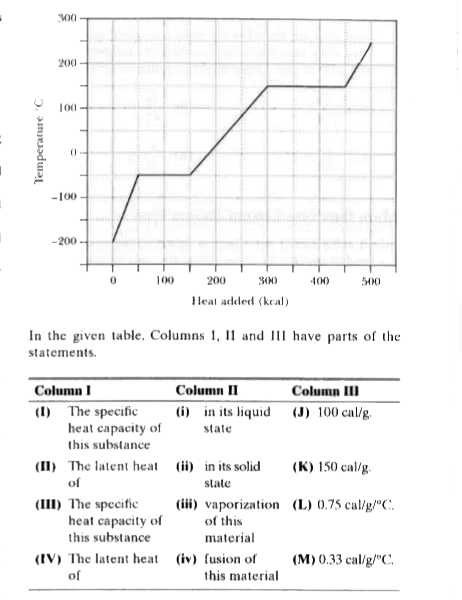Complete Solutions to PRACTICE QUESTIONS( LINKED COMPREHENSION) of chapter HEAT-MEASUREMENT AND TRANSFER of Class 12 book with complete answers and questions
| Class 12 | PHYSICS |
| Chapter | HEAT-MEASUREMENT AND TRANSFER |
| RESNICK AND HALLIDAY | PRACTICE QUESTIONS( LINKED COMPREHENSION) |
| Number Of Questions | 9 |
| Academic Year | 2023-24 |
A 0.0500 kg lead bullet of volume `5.00 xx 10^(-6) m ^(3)` at `20.0^(@)C` hits a block that is made of an ideal thermal insulator and comes to rest at its center. At that time, the temperature of the bullet is `327^(@)C`. Use the following information for lead `:`
Coefficient of linear expansion `: alpha = 2.0 xx 10^(-5)// ""^(@)C`
Specific heat capacity `:` `c = 128 J // ( kg . ""^(@)C )`
Latent heat of fusion `:` `L_(1) = 23 300 J // kg`
Melting point `:` `T_("melt") = 327^(@)C`
How much heat was needed to raise the bullet to its final temperature ?
View SolutionA 0.0500 kg lead bullet of volume `5.00 xx 10^(-6) m ^(3)` at `20.0^(@)C` hits a block that is made of an ideal thermal insulator and comes to rest at its center. At that time, the temperature of the bullet is `327^(@)C`. Use the following information for lead `:`
Coefficient of linear expansion `: alpha = 2.0 xx 10^(-5)// ""^(@)C`
Specific heat capacity `:` `c = 128 J // ( kg . ""^(@)C )`
Latent heat of fusion `:` `L_(1) = 23 300 J // kg`
Melting point `:` `T_("melt") = 327^(@)C`
What is the volume of the bullet when it comes to rest ?
View SolutionA 0.0500 kg lead bullet of volume `5.00 xx 10^(-6) m ^(3)` at `20.0^(@)C` hits a block that is made of an ideal thermal insulator and comes to rest at its center. At that time, the temperature of the bullet is `327^(@)C`. Use the following information for lead `:`
Coefficient of linear expansion `: alpha = 2.0 xx 10^(-5)// ""^(@)C`
Specific heat capacity `:` `c = 128 J // ( kg . ""^(@)C )`
Latent heat of fusion `:` `L_(1) = 23 300 J // kg`
Melting point `:` `T_("melt") = 327^(@)C`
What additional heat would be needed to melt the bullet ?
View SolutionTwo bars, A and B, each of length 2.0 m and cross-sectional area `10m^(2)`, are placed and to end as shown in the figure.
The thermal conductivities of the bars are `k_(A) = 339 ( J //s. m.K)` and `k_(B) = 837 J//(s.m.K)`, respectively. The left end of bar A is maintained at 373 K while the right end of B is maintained at 273 K

Which one of the following statements is true concerning the above situation ?
View SolutionTwo bars, A and B, each of length 2.0 m and cross-sectional area `10m^(2)`, are placed and to end as shown in the figure.
The thermal conductivities of the bars are `k_(A) = 339 (J //s. m.K)` and `k_(B) = 837 J//(s.m.K)`, respectively. The left end of bar A is maintained at 373 K while the right end of B is maintained at 273 K

Wha tis the temperature at the interface between A and B?
View SolutionMatch the laws given in Column I to the respective correct statement given in Column II.
`{:("Column I","Column II"),((a)"Wien's displacement law explains" ,(p) "why days are hot and nights are cold in deserts"),((b) "Planck's law explains",(q) "why a blackened platinum wire, when gradually heated, appears first dull red and then blue"),((c ) "Kirchhoff's law explains",(r ) "the distribution of energy in blackbody spectrum at shorter as well as longer wavelengths"),((d ) "Newton's law of cooling explains that ",(s ) "the rate of cooling of body is proportional to the excess temperature of the body over the surroundings"):}`
View SolutionIn the question, there is a table having 3 columns and 4 rosw. Based on the table, there are 3 questions. Each question has 4 options (a), (b) , (c ) an (d), ONLY ONE of these four options is correct.
Heat is added to a 1.0 kg solid sample of a material at `-200^(@)C` .The figure shows the temperature of the material as a function of the heat added.

Which one of the following combination about the heat capacity of the substance is correct ?
View SolutionIn the question, there is a table having 3 columns and 4 rosw. Based on the table, there are 3 questions. Each question has 4 options (a), (b) , (c ) an (d), ONLY ONE of these four options is correct.
Heat is added to a 1.0 kg solid sample of a material at `-200^(@)C` .The figure shows the temperature of the material as a function of the heat added.

Which one of the following combination is correct about change of state of substance from solid to liquid ?
View SolutionIn the question, there is a table having 3 columns and 4 rosw. Based on the table, there are 3 questions. Each question has 4 options (a), (b) , (c ) an (d), ONLY ONE of these four options is correct.
Heat is added to a 1.0 kg solid sample of a material at `-200^(@)C` .The figure shows the temperature of the material as a function of the heat added.

Which one of the following combination is correct about change of state of substance from liquid to gas ?
View Solution
PRACTICE QUESTIONS( LINKED COMPREHENSION) questions and complete solutions for chapter HEAT-MEASUREMENT AND TRANSFER of RESNICK AND HALLIDAY PHYSICS (HINGLISH) of Class 12
All Exercises from RESNICK AND HALLIDAY Class 12 PHYSICS HEAT-MEASUREMENT AND TRANSFER
- CHECKPOINT 1
- CHECKPOINT 2
- PRACTICE QUESTIONS
- PRACTICE QUESTIONS( INTEGER TYPE)
- PRACTICE QUESTIONS( LINKED COMPREHENSION)
- PRACTICE QUESTIONS(MORE THAN ONE CORRECT CHOICE TYPE )
- PROBLEMS
- SOLVED PROBLEM 19.01
- SOLVED PROBLEM 19.02
- SOLVED PROBLEM 19.03
- SOLVED PROBLEM 19.04
- SOLVED PROBLEM 19.05
- SOLVED PROBLEM 19.06
- SOLVED PROBLEM 19.07
- SOLVED PROBLEM 19.08